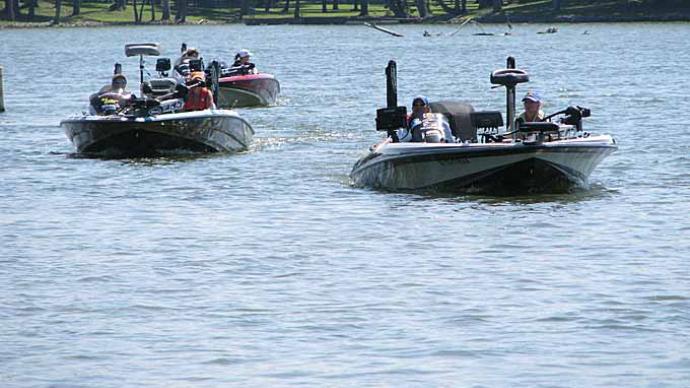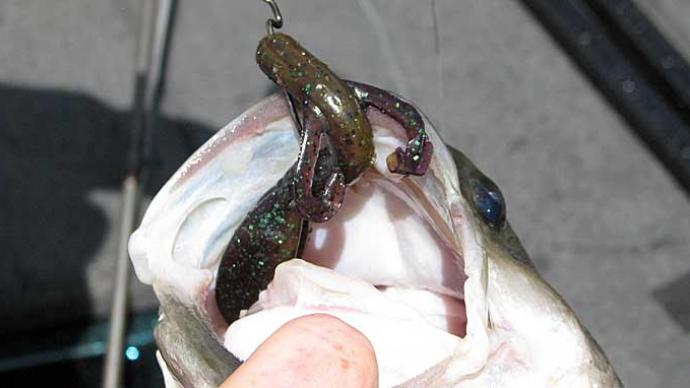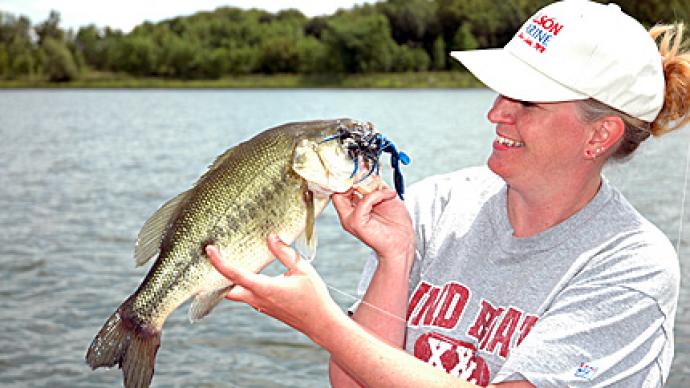Partner Selection
From the very beginning, the partner selection process is one of the primary issues to concern yourself with when fishing a buddy tournament. You have to ask yourself, "who do I fish with." I have many friends in the industry to whom I could turn, but would we be able to work with each other for eight-plus hours a day in the confines of a bass boat?
As it turned out, my partner chose me, and I still consider myself very fortunate to find such a first-rate angler and friend.
We first met via e-mail and soon after on the telephone after he had read some of my articles on turning professional back in 1998. We never met until he came to my rescue on another tournament in July of 2000, where my previous partner at the time canceled at the last moment. My new and current partner Swift Spaulding, of Germantown, MD, drove several hundred miles from his home to upstate New York to fish the Hudson River with me, and I never forgot it. From a man I had never met, this unselfish act of friendship left me feeling that I had found a true friend and a first-rate fishing partner. He was the obvious choice for me. However, there are many things to look for in a partner, but your gut often tells you if you have the right person for the job.
A plus in this relationship is that our fishing styles complement each other, so we don't waste time fishing the same lures or techniques. Both of us have mastered the suite of riggings and set-ups used on the professional circuits and have (over the years) fine-tuned them to suit our thinking and confidence levels.
Pre-Tournament Preparation
Priority number one is accommodations and food. Both areas are vital as clothing on a cold day, as you need your rest and eat wholesome food, ensuring your body can cope with the demands of the tournament day/s ahead.
When I fish trails on my own, I usually bring home-cooked food frozen to cover me for the week and bring a small microwave oven to cook for myself. It saves money and time, plus I get to eat Linda's home cooking, even when I am over one thousand miles away!
Early in the planning stages, Swift and I have to decide who is bringing their boat (distance and home location play a role here), or do we use both boats and "double-up" on practice time? I like to bring mine with me. I guess it is a confidence thing.
With these matters settled, we can concentrate on map work and locations. As I mentioned before, Swift is in Maryland, and I am on Long Island in New York, so we "snail mail" each other information, talk on the phone, and e-mail each other ideas, information, rumors, and gossip!
We do not necessarily believe all we hear, but we put everything we have into the mix, stir it up and see what falls out! Once we have chosen the locations, we then decide (if we have two boats) who are going north, south, east, or west.
Practice Days
I have mixed emotions over practice. If I have had a good practice, I usually have a terrible tournament and vice-versa. But whatever happens, practice never (at least for me) seems to hold up for the tournament. I still do practice, and I still do it with conviction; it would be pointless without that. The problem for me is trying to believe that just once, the weather will cooperate and both the practice and the tournament days will be identical, and the fish will stay put! (Dream On!)
So to get back to the storyline, Swift and I keep in touch throughout the practice day/s with mobile phones and walkie-talkies so we can keep up on each other's progress, discovery and problems. A vital piece of information is the time of day when you catch your fish. Swift and I have often compared notes and discovered "optimum feeding times," which prove very useful during all the tournaments.
Tournament Eve
Well, the practice is over, and we will now look at the Weather Channel as if it were the Playboy Channel, hoping to see something worthwhile before we go to sleep! This will be repeated nightly for the next two or three days (depending upon the tournament trail). Now, all we have to do is pray that in the morning, the weather improves or stays identical to the day/s of practice where (if we were fortunate enough) we caught numbers of keeper-sized fish. I am sure some of my colleagues on the pro circuit are now sympathizing with me about watching that damn "Weather Channel." Why is it that during practice, the sun stays behind the clouds? Or there is no breeze, and the sky is just nicely overcast? However, when tournament day arrives, everything changes, usually to one of the following:
- it will snow so heavily that you can't see your hand in front of your face.
- blow a "force ten" gale with hailstones the size of truck tires.
- pour with rain similar to standing in the shower fully clothed.
- or, you end up with bluebird skies. Go Figure!
Usually, in a larger tournament situation, you will have received your flight and boat number that evening so you can make adjustments to your game plan should you get a good or bad draw. I should explain for our readers who may not yet have fished in a tournament situation. When many boats are brought together for a tournament, controls for a safe departure and sensibly spaced weigh-in procedures are required. On the evening before the start of the tournament, all anglers will assemble at a pre-determined location to receive their boat and flight number. For example, if there are 300 boats in a competition, the tournament director will usually split the boats into "flights."
Flights are made up of an equal number of boats that will be inspected and allowed to depart orderly. The inspection will include checking that your life vests are zipped, snapped, or buckled livewell lids open and operational, plus running lights front and back in the "on" position. If any of these items are inoperative or incorrect, it will result in your removal from the line, and you will be the last boat to depart! So each flight is called, and the boat number drawn by you or given to you by a computer drawing will be called. As the flights depart and time elapses, additional time will be added to those in the later flights making it a "fair days fishing" for everyone.
Upon returning, you will be logged in as having returned safely and then given the necessary weigh-in bags to bring your fish to the scales. Just imagine for a moment if everyone were to return simultaneously! What chaos would ensue, and many hundreds of fish would perish. It is important to note that failure to return at your scheduled time will result in disqualification for that day, and your fish will be returned to the water without being weighed. The bringing of undersized fish to the scale will also penalize you with weight reductions. Rule of thumb READ THE RULES!
The Road To The Championship
This year, our four tournaments took us to the great states o: Connecticut, Maryland, and New York.
Candlewood Lake, CT
Our first stop was Candlewood Lake, near Danbury, Connecticut. I fish Candlewood often during the regular season and have a lot of success during the warmer months with both large and smallmouth bass. However, the early season has always been challenging for me, and I knew this tournament would be no exception. I had blanked on the lake the prior year and felt I had forgotten everything I had ever learned about fishing! This two-day event put both of us to the test. To cut a long story short, we caught undersized fish every day; however, we did make it with one keeper fish each day for our trouble. Not a great start to the 2001 tour! Final weight and standing: 2 bass, 2.16lbs, 115th place. Baits: Jerkbaits and Yamamoto 4 inch cut tail worms.
I had to fly to Miami, Florida, that night for a three-day exhibition, and I replayed those two Connecticut days repeatedly in my head. My conclusion was we did nothing wrong. We did not find the quality of fish required.
Potomac River, MD
The second venue on the FOXWOODS trail was the Potomac River, near La Plata, Maryland. This is Swift's backyard, and we expect to do very well here. Swift had done his homework and located several areas for us to practice on.
We had decided to go with one boat, which proved to be very sensible. Only a seasoned angler would know about many hazardous areas on the Potomac, so I put myself entirely in Swift's hands.
We caught nine keeper-sized (15 inches and above) bass in two days. We consider the value of points and a healthy weight a good omen as we move onwards. Final weight and standing: 9 bass, 18.63lbs, 29th place. We were now in 47th place overall for the Classic, and it felt so close we could taste it! With just two more events, could it be possible? Baits: Mann's Baby-1 Crankbait, the Gary Yamamoto 4 inch cut tails, and the mighty Senko.
I should point out at this juncture I was thrilled, but this was not what Swift had expected. He is often very hard on himself as a professional angler (as he was in his previous life as a professional cyclist) and for no good reason! He is a damn good fisherman and always does his very best. More than that is in the hands of the Lord! I used to beat myself up, too, but you can only do your best. If you do and it does not work out, you should be able to walk away with your head held high, knowing you did your utmost! Only experience will give you that ability, and it's a harsh lesson to learn.
Lake George, NY
I had never fished this lake before, and I had no time to practice due to prior commitments. Swift had traveled there earlier in the week with his wife and daughter and practiced for two days prior. When I arrived with my wife Linda, we all went over my notes from mutual friends and his findings and threw together a plan for the next two days. We fished on one private dock, which produced over 50 fish in the two days and a tree that had only recently fallen into the water. Add an audience of about 20 people who owned the dock and clapped each time we caught a fish! It was a very special time, and the people of Lake George are to be commended for their encouragement, hospitality, and friendship.
We caught a limit, each day with a kicker fish of just under 4lbs. Final weight and standing: 16 bass, 22.73lbs, 66th place. With this weight, we slipped from 47th into 53rd place for the Classic. We were now going to play all our cards on the Hudson River in two weeks. Neither of us ever discussed this, not even now as I write, but I think Swift and I were so determined to make the Classic that we mentally made a pact with ourselves to "go for broke" on this last tournament of the series.
Hudson River, NY
I never thought I would ever have been able to say this, but the Hudson River was calm and flat as a pancake during practice and on the first day of the tournament. Day two would be windy, but the major problem was boat traffic on the main river. Caution was the keyword, and "reading the water" would be vital in staying dry and safe. During practice, Swift had traveled south to fish the famous "chestnut beds," and I had traveled north to fish my favorite creek and some other main river point locations. We both found fish, and after comparing notes, we realized the tides would play a vital role in our decision-making for both days of the tournament. Swift had found quality fish in the morning, and I had a strong afternoon bite in the creeks. As those of you who fish rivers know only too well, the tides change dramatically within three days, so backup plans had to be made to ensure our patterns did not fall apart. We caught only three fish on day one, but it was enough to bring us around 6 lb. When we saw the standings after day 1, we realized we needed another six-plus pounds on day 2 to make the Classic. We were very nervous as our first-day fish were not where they were supposed to be, and it looked like time was running out!
On the final day, we threw caution to the wind and ran the 45 miles south to a chestnut bed that had produced well in practice but had done nothing on day 1 of the tournament. Little did we know that by 11 am, the four fish we caught would be all we would catch. Would it be enough? What made things worse was that I had lost a fish at the boat around the 2lb mark that would have been (I thought at the time) a "kicker," which would add to the weight we were looking for. I kicked myself for the rest of the day, thinking that "I had lost our place in the Classic" because of that one fish.
Was it enough? Had we cut things too close? A million questions surged into my brain, and I had to walk away from the weigh-in site and try to clear my head. Returning about forty-five minutes later, we discovered there was a delay in the final place standings for the Classic. Of course, I thought, "It's us. I lost that fish, and now we will get bumped by an ounce "!
The tournament director (Lee Bailey Jr.) began reading the list and started in 50th place. 49, 48, 47, my heart sank. I said to myself, "there is no way we were higher than 47th". Lee continued to read the 46th place, 45, 44, 43 "Charles Stuart and Swift Spaulding." Oh my God! I jumped into the air as if I had scored a grand slam at Yankee Stadium and began hugging anyone within a thirty feet radius! I kissed total strangers and "hollered" like an overzealous cowboy on a cattle drive! WE WERE GOING TO THE CLASSIC!
To be continued...
Stuart is a pro angler who fishes the B.A.S.S. Invitational circuit, the REDMAN Northeastern trail, and the FOXWOODS trail. He is sponsored by Bullet Weights, G.Loomis, Gamakatsu, Lake Hawk, Chevy Trucks, Hawg-ly Lures, Uncle Josh, Ike-Con Fishing Tackle, Snap-Set Spinnerbaits, Map-Trap, Stamina Components, and Power Troll Batteries.



